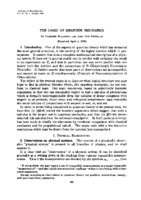| dc.contributor.author | Birkhoff G., Neumann J. | |
| dc.date.accessioned | 2016-02-20T00:45:53Z | |
| dc.date.available | 2016-02-20T00:45:53Z | |
| dc.date.issued | 1936 | |
| dc.identifier.isbn | | |
| dc.identifier.issn | | |
| dc.identifier.uri | http://ir.nmu.org.ua/handle/GenofondUA/16957 | |
| dc.description.abstract | One of the aspects of quantum theory which has attracted the most general attention, is the novelty of the logical notions which it presupposes. It asserts that even a complete mathematical description of a physical system S does not in general enable one to predict with certainty the result of an experiment on S, and that in particular one can never predict with certainty both the position and the momentum of S (Heisenberg's Uncertainty Principle). It further asserts that most pairs of observations are incompatible, and cannot be made on S simultaneously (Principle of Non-commutativity of Observations).The object of the present paper[1] is to discover what logical structure one may hope to find in physical theories which, like quantum mechanics, do not conform to classical logic. Our main conclusion, based on admittedly heuristic arguments, is that one can reasonably expect to find a calculus of propositions which is formally indistinguishable from the calculus of linear subspaces with respect to set products, linear sums, and orthogonal complements-and resembles the usual calculus of propositions with respect to and, or, and not. In order to avoid being committed to quantum theory in its present form, we have first (in §§2-6) stated the heuristic arguments which suggest that such a calculus is the proper one in quantum mechanics, and then (in §§7-14) reconstructed this calculus from the axiomatic standpoint. In both parts an attempt has been made to clarify the discussion by continual comparison with classical mechanics and its propositional calculi. The paper ends with a few tentative conclusions which may be drawn from the material just summarized. | |
| dc.language.iso | English | |
| dc.publisher | | |
| dc.subject | Физика\\Квантовая физика | |
| dc.subject | Physics\\Quantum Physics | |
| dc.subject.ddc | | |
| dc.subject.lcc | | |
| dc.title | The Logic of Quantum Mechanics | |
| dc.type | other | |
| dc.identifier.aich | TPAH7QTCWN222FOXX7YMSM7LDQ6Q2KZA | |
| dc.identifier.crc32 | 88F3122E | |
| dc.identifier.doi | | |
| dc.identifier.edonkey | 66F101456467AE12A41EA5D97D218F99 | |
| dc.identifier.googlebookid | | |
| dc.identifier.openlibraryid | | |
| dc.identifier.udk | | |
| dc.identifier.bbk | | |
| dc.identifier.libgenid | 140057 | |
| dc.identifier.md5 | 9C9781FD84DA8E0419973D60506C432A | |
| dc.identifier.sha1 | MFF7AYBEFJ2T6MRCDXDYSI7PMDYE6WBT | |
| dc.identifier.tth | QKVNJA33W7GSBMH6D6E6ZCW2DMZAV22HKO2AKFQ | |

